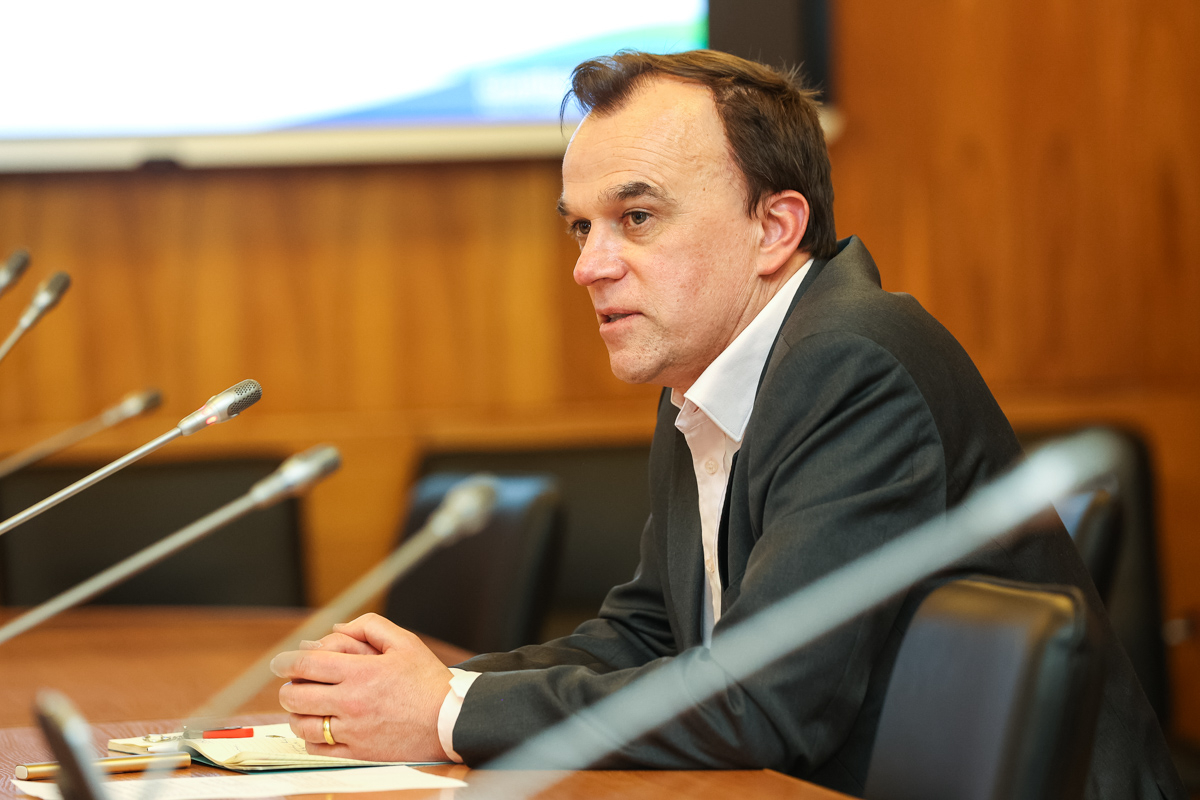British glaciologist Martin Siegert visits St Petersburg University

Professor Martin Siegert, Co-Director of the Grantham Institute for Climate Change and the Environment at Imperial College London, Chairman of the UK Arctic & Antarctic Partnership, has visited St Petersburg University. The purpose of his visit was to discuss the issues of research conducted in the Arctic and the Antarctic.
Arctic projects of St Petersburg University
As Sergey Andryushin, Deputy Rector for International Affairs, noted in his welcoming speech, research in the Arctic and the Antarctic is one of the University's key areas of scientific and educational activities. Thus, the University implements academic programmes dedicated to polar and marine research and integrated development of the Arctic region.
Since 2012, St Petersburg University has been a member of the most authoritative scientific and educational association in the world – the University of the Arctic. Currently, St Petersburg University closely cooperates on Arctic issues with Norway, Germany, Finland and France. In 2021, the Arctic Project Office was established at St Petersburg University. Its purpose is to combine the resources of the University and partner organisations for the development of Arctic research.
Sergey Andryushin, Deputy Rector for International Affairs
Kirill Chistiakov, Vice-President of the Russian Geographical Society, Director of the Institute of Earth Sciences at St Petersburg University, clarified that one of the oldest international double degree programmes (at St Petersburg University and Universität Hamburg ) is the Polar and Marine Sciences (POMOR) master’s programme. It was opened 21 years ago and a lot of internationals students have studied in it.
'However, there are other programmes – for example, CORELIS (Cold Region Environmental Landscapes Integrated Science), the interaction within which we would like to discuss with Professor Martin Siegert. We are interested not only in education issues but also in scientific research. Particularly, the research on the palaeoclimate of the Arctic and the Antarctic,' said Kirill Chistiakov.
Kirill Chistiakov, Director of the Institute of Earth Sciences, added that the staff and graduates of the University are currently researching the ice of Lake Vostok. In addition, University scientists work in the Arctic region, where they study the bottom sediments of lakes. Currently, researchers face the difficult task of studying greenhouse gas balances at high latitudes. That is why St Petersburg University cooperates with the Russian Antarctic Expedition, as well as with other expeditions that are implemented under the programmes of the Russian government.
I would like to underline that every year we send dozens of employees and students both to Antarctica and the Arctic region. And we are happy to expand international cooperation as a result of our discussion.
Kirill Chistiakov, Vice-President of the Russian Geographical Society, Director of the Institute of Earth Sciences at St Petersburg University
Taking the floor, Martin Siegert raised the topic of climate change and the importance of the net-zero emissions transition.
‘Politicians, of course, help scientists to achieve the goals of reducing carbon dioxide in the atmosphere. However, I don't think they have all the answers to solve the global problem of climate change – it's impossible. We will only be able to change the situation when we start working together. Not only scientists and politicians but also business,’ stressed Martin Siegert.
According to Professor Siegert, an important task for Imperial College London is to train business leaders focused on solving environmental issues. He noted that it is necessary to create a sustainable society with zero carbon emissions. To achieve this goal, it is important to support international climate change research. After all, climate change is a global problem of the 21st century.
However, it is important that the world's universities focus their attention not only on the study of this problem but also on training eco-specialists.
Martin Siegert, a British glaciologist
‘We all need to think about how well we are currently preparing students to overcome this obstacle because their entire future careers will be developed under the influence of this global problem,’ concluded Professor Siegert. In this regard, the glaciologist suggested that St Petersburg University consider the possibility of concluding a cooperation agreement with a network of British universities in the field of climate change.
During the meeting, the sides discussed issues of creating a double degree programme ‘Ecology and Nature Management’ based on the CORELIS master’s programme, as well as expanding academic exchange programmes for students and staff.

